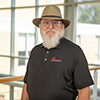
Philip Crawford, Ph.D.
Chair/Professor — Chemistry & Physics
MOST RECENT/NOTABLE PUBLISHED WORK
E. Miller, et al., “Voltammetric Study of Some 3-Aryl-quinoxaline-2-carbonitrile 1,4-di-N-oxide Derivatives with Anti-Tumor Activities”, Molecules, 2017, 22, 1442
E. Torres, et al., “Novel Quinoxaline 1,4-Di-N-oxide Derivatives as New Potential Antichagasic Agents”, European Journal of Medicinal Chemistry, 2013, 66, 324-334
S. Pérez-Silanes, et al., “Cyclic Voltammetric Study of Some Anti-Chagas Active Quinoxaline 1,4-Dioxidoquinoxalin-2-yl Ketone Derivatives”, Helvetica Chimica Acta, 2013, 96 (2), 217
WHAT AREA DO YOU TEACH?
General Chemistry and Analytical Chemistry
EDUCATION/DEGREE(S)
B.A. (Chemistry), University of Indianapolis
M.S. (Organic Chemistry), University of Wisconsin-Milwaukee
Ph.D. (Analytical Chemistry), Marquette University
YOUR PHILOSOPHY OF TEACHING:
I am committed to students and strive for teaching excellence, making myself available to students as much as possible through office hours, an “open-door” policy, and help sessions. As someone committed to the teacher-scholar model, I have mentored a number of students, both undergraduate and graduate, in my research lab, and believe in providing students with experiential learning opportunities.
WHY DID YOU DECIDE TO TEACH?
I decided to teach for several reasons. (1) I wanted to work in a field where I would be involved in life-long learning. In order to do well in this field, professors have to study and participate in research in order to grow and develop professionally, just like their students do. (2) I wanted to work in a field where I could help young adults develop and grow as scholars and critical thinkers, as well as gain the skills and knowledge they need to pursue their career goals. Whether in a classroom or lab, professors can serve as positive role models, teachers, mentors, and advisers for their students. (3) I wanted to work in a field where I have more freedom to pursue my own professional interests. Professors have the freedom to choose their areas of research or the topics they wish to study, which is not the case for Ph.D.'s working in industry or government. (4) I love the college atmosphere, whether I am in a classroom, in a lab, or attending a sporting or theatrical event. There always seems to be energy and excitement somewhere on a college campus throughout the academic year.
CREDENTIALS/CAREER PATH
I earned my Ph.D. in Analytical Chemistry from Marquette University in 1991, and then served one year as a postdoctoral researcher at Indiana University-Purdue University at Indianapolis (IUPUI) working on Marcus Theory in the research lab of Dr. Franklin Schultz. I joined the faculty at Southeast in 1992 and have been here ever since. I have taught a number of different courses, ranging from general chemistry to senior and graduate level courses, developed and team-taught several new courses, and have been involved in curriculum development. And I have served as a departmental chairperson for over 16 years.
PROFESSIONAL HIGHLIGHT
Over 26 years working in higher education.
AWARD/HONOR/RECOGNITION
Written or coauthored successful grant proposals with funding totaling over $2 million.
ORGANIZATION WITH WHICH YOU ARE INVOLVED
Alpha Chi Sigma
BEST ADVICE FOR STUDENTS
There are several pieces of advice I would give to students. (1) If you are a student interested in a scientific career, you should obtain as much career-related professional experience, whether in the form of an internship, undergraduate research, student employment as a lab assistant, or job shadowing, as you can while attending Southeast. These experiences are of special interest to many employers who hire science graduates. (2) Get to know your faculty, especially those in your "home" department. Seek out professors during office hours or after class to ask questions, obtain academic advice, or simply to get acquainted. Work with professors on undergraduate research projects or as undergraduate lab assistants. Someday, you will need some of your professors to write letters of reference for you when seeking employment or admission into graduate or professional programs after graduation. The best and strongest letters of reference will come from faculty members who are well acquainted with you and your abilities.